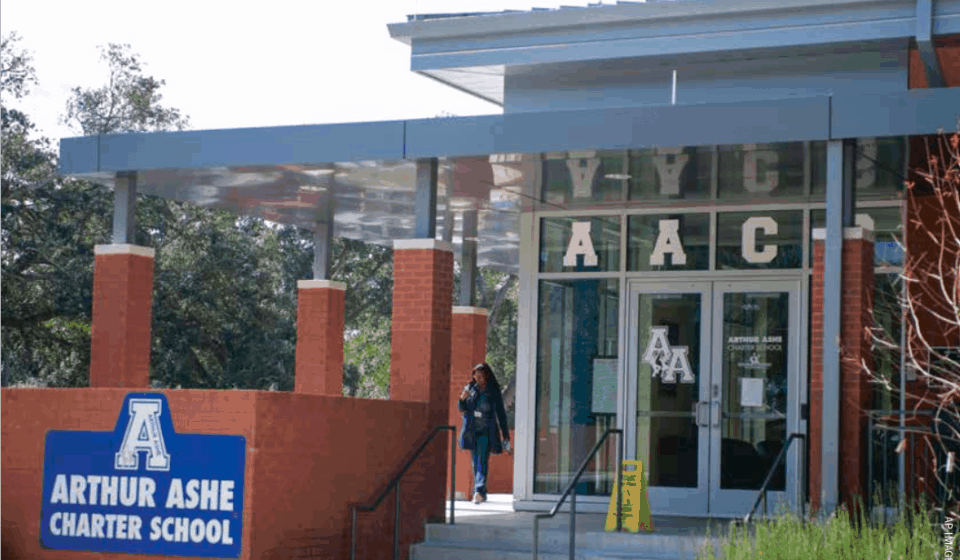In the past few years, Georgia State University professor Kristen Buras1 has tried to make a name for herself by bashing the progress made in New Orleans’ public school system since Hurricane Katrina. She recently reached a new low with an article she wrote for The Progressive entitled, “Charter Schools Flood New Orleans.”
For those of us who have been involved in the post-Katrina transformation of New Orleans’ public school system, the claims in Buras’ article are so far removed from reality that one must question the underlying motivations of the author and her editors at The Progressive. To illustrate this fact, I’ve reproduced the article below and highlighted the factual inaccuracies and misleading statements Buras makes in the course of the piece.

Charter Schools Flood New Orleans
By KRISTEN BURAS on December 26, 2014

This story appears in the current issue of our magazine. Subscribe to read the full issue online.
Within days of Hurricane Katrina, the conservative Heritage Foundation advocated the creation of a “Gulf Opportunity Zone,” including federal funds for charter schools and entrepreneurs. Slowly but surely, the narrative of disaster turned to one of opportunity, even triumph. We were told that families abandoned in the storm were finding new hope in transformation of the city’s public schools by charter school operators.Report after report praised New Orleans as a model for urban school districts across the nation. Charter school operators, most of them white, declared “school choice” to be the new civil rights movement.
Now, almost a decade later, New Orleans is the nation’s first all-charter school district. Charter advocates describe the district’s achievements as nothing short of a miracle.
The truth is quite different: Flooding New Orleans with charter schools has been disastrous.
I was born and raised in New Orleans and have been studying education reform there for the last decade. One black veteran teacher told me what transpired in the wake of the storm. Policymakers declared, “You no longer have jobs. The local district no longer exists. We’re going to split it up, make some charters. The state’s going to take control of everything.”During an exchange with one state legislator, this teacher asked how the legislature could take such drastic action without public input. The legislator’s response was brutally candid: “We called up a few people that we knew were back in town and invited them over to my house, and we sat down and began to dismantle the district.” Justifiably angered, the teacher responded, “These are the kinds of underhanded tactics that were going on while our schoolchildren were still floating in the waters of Katrina.”
In November 2005, barely two months after Katrina, Louisiana Governor Kathleen Blanco called a special legislative session. This was the occasion for passing Act 35, which changed the definition of a “failing” school from a performance score of 60 (on a scale of 200) to 87.4, just below the state average. This allowed the state-run Recovery School District to assume control of 107 of 128 public schools in Orleans Parish, enabling charter expansion on a scale never before attempted in Louisiana or elsewhere. It was the ultimate public private partnership—state officials serving the interests of private businesses rather than local communities, especially communities of color.
Although a state law, Act 35 specifically targeted the majority-black Orleans Parish. Before its passage, state officials crunched numbers in Baton Rouge to determine the school performance score cut-point and district size that would enable mass takeover only in New Orleans. Act 35 stipulated the Recovery School District could not assume control of failing schools in districts with fewer than thirty schools; fifty of sixty-four districts in Louisiana have fewer than thirty schools.
Among the remaining districts, the state took over and chartered failing schools only in New Orleans immediately after Katrina.The fact is, white policymakers and education entrepreneurs were hell-bent on chartering New Orleans public schools, populated almost entirely by black students and unionized black veteran teachers. The Orleans Parish School Board had an operating budget of approximately $400 million in 2005-06—hardly chump change. Most of these monies would be allocated to the state-run Recovery School District and privately operated charter schools, with only a handful of traditional public schools remaining under the locally elected board.
Not unlike the French Quarter, the city’s public schools would become a playground for outsiders—only instead of spending money, education entrepreneurs would pocket it.
In late 2005, officials announced that all public school employees in Orleans Parish would be fired. That’s right—all! There was no due process, no consideration for veteran teachers’ hard work or lifetime of accrued benefits, much less the collective bargaining agreement of United Teachers of New Orleans. The state claimed there was a teacher shortage, and the Louisiana Department of Education advertised nationwide for positions in the Recovery School District.Reflecting on this, one longtime teacher asserted, “It’s all about the dollars. Our rights as teachers have been trampled upon. Reformers say they are revamping the schools. They get rid of everyone, and they rehire whoever they want. In many cases, they replace veteran teachers with first, second, and third year teachers.”
This kind of cost-cutting is done at the expense of black children, taught by people with little experience or connection to the community. In fact, former Recovery School District superintendent Paul Vallas explained to BBC News in 2010: “I don’t want the majority of my teaching staff to work more than ten years. The cost of sustaining those individuals becomes so enormous. Between retirement and health care, it means that you are constantly increasing class sizes and cutting programs to sustain the cost of a veteran workforce.”
With Teach For America and other “human capital” providers in place, there would be no such worry. Most Teach For America recruits don’t teach for longer than two or three years, and charter school employees are rarely unionized.
Truth be told, Teach For America is a teacher-union-busting machine, and a best friend of charter school operators, who care less about the teaching qualifications of those placed in classrooms and more about their bottom line. In 2005, only 10 percent of New Orleans’ teachers were in their first or second year of teaching. Three years later, 33 percent were. In 2010-11, nearly 40 percent of the city’s teachers had been teaching for three years or less, and the percentage of white teachers had nearly doubled.
It is difficult to imagine that well-paid white charter school operators would send their own kids to schools where so many of the teaching staff have never held a teaching position before.
I remember seeing a video produced by an edu-business consulting group in New Orleans. It showed typical scenes from the French Quarter, where twenty-somethings share how much they love the food, weather, and bands. One young white newcomer explains she taught ninth-grade math and is now CEO of a start-up company that sells data management software to schools. The line between tourist, teacher, and profiteer is thin indeed.
With the autonomy to virtually do whatever they please, charter schools ought to have high performance delivered, you might think. After all, advocates of free-market school reform assert that government bureaucracy and interference undermine urban public schools.There was a public hearing in 2010 on whether or not New Orleans’ schools would be returned to local control or remain under the Recovery School District. Hundreds of people from the city’s African American community attended the hearing, with anti-RSD protest signs dotting the audience.
A respected community activist took the microphone: “What we’re talking about here tonight is a simple question of democracy. We want in Orleans Parish what every other parish has in this state and that’s the right to control our own schools. High crimes and misdemeanors have been carried out by the RSD and the people who run these charter operations. We don’t believe that these schools have served the best interests of African American students.”
A veteran of the city’s civil rights movement also spoke, reminding everyone that an earlier generation of activists “went to jail and died for us to have the right to vote for who we want to represent us.” She concluded her comment by pointing to Paul Vallas, underscoring that he was never elected but oversaw most schools in Orleans Parish.
The feeling of disenfranchisement was palpable that evening. But afterwards unelected charter school board members were given the right to determine whether or not schools remained under the Recovery School District. Not surprisingly, almost every charter school did.
That’s the name of the game when it comes to charter school reform: disempowering the locally elected school board and communities, while consolidating power and money in the hands of unelected and unaccountable private operators.Charter school expansion in New Orleans has generated a host of lawsuits. Veteran teachers lodged a wrongful termination suit. Two lower courts ruled in favor of the teachers, but the Louisiana Supreme Court recently overturned those rulings. The case is on appeal to the U.S. Supreme Court.
The Southern Poverty Law Center filed a federal civil rights lawsuit alleging violations of the Individuals with Disabilities Education Act. Approximately 4,500 students with disabilities assert that they have been denied access and/or appropriate services by public schools in New Orleans, the majority of them charters. This case remains under way, with reports that violations have worsened rather than being resolved since its initiation. Why would profit-hungry school operators embrace those children? They’re expensive and could compromise performance of the “business.”A civil rights complaint against Collegiate Academies, a private charter operator in New Orleans, asserts that its schools are based on “a harsh and punitive discipline culture” that “endangers the safety and welfare of students, violates students’ rights under state and federal laws, pushes students out for minor infractions, and ultimately deprives students a right to education guaranteed by the Louisiana Constitution.”
Collegiate Academies has one of the highest out-of-school suspension rates in the city. One of the high schools it operates suspends almost 70 percent of its students. On behalf of students and parents, Loyola University New Orleans College of Law filed a complaint against three charter schools operated by Collegiate Academics. It alleges “out of control suspension practices for trivial matters,” “failure to report injuries to parents,” and “bullying and harassment of children with special needs,” among others.Even when charter schools fail, charter school operators are paid executive-level six-figure salaries. The CEO of Future Is Now, a charter operator in New Orleans, was paid a salary of $250,000 when John McDonogh High School, seized by Future Is Now despite community resistance, posted a performance score of 9.3 on a scale of 150. Call me crazy, but I don’t think that taxpayers received their money’s worth.
In 2012, students from various historic high schools in New Orleans that had been taken over and chartered issued a list of demands to the Recovery School District.“A lot of money has come to New Orleans for education reform,” they protested, “but none of it benefits the children.”
“People are making a lot of money on the backs of poor black children in New Orleans,” they continued, “We want resources for our schools. We do not want to line the pockets of other people.”
Kristen Buras is an associate professor in educational policy studies at Georgia State University. She is the author of Charter Schools, Race, and Urban Space: Where the Market Meets Grassroots Resistance. She is also director and co-founder of the New Orleans-based Urban South Grassroots Research Collective for Public Education. To reach her, or to get a discount code for her book, contact kburas@gsu.edu.
- Full disclosure: Buras once filed a DRM takedown request with Twitter against me after I pointed out that her New Orleans education reform conspiracy flowchart quizzically had a Star of David at its center ↩


We have to read this for our Education class at LSU and as a New Orleans native it honestly just pisses me off. Everything she writes about is chocked up to being racially motivated. This is a very narrow mindedly written book with an agenda.
It’s totally biased and filled with so many inaccuracies it’s ridiculous. The scary thing is that there are many education professors at LSU and elsewhere who assign garbage like this in their classes as if it’s an accurate portrayal of the situation in New Orleans or reforms in general. How was it presented in your class and which class was it at LSU?